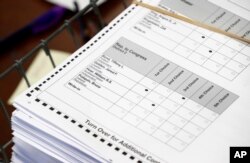A new U.S. assessment of foreign interference in the 2018 congressional elections has concluded that outside meddling had no effect on the integrity and security of the voting systems, but the government didn’t say whether foreign actors influenced the outcome of the election.
The classified report by the U.S. departments of Justice and Homeland Security found "no evidence to date that any identified activities of a foreign government or foreign agent had a material impact on the integrity or security of election infrastructure or political/campaign infrastructure" used in the midterm elections, the agencies said in a statement released Tuesday.
The joint report, delivered to President Donald Trump on Monday, was prepared in response to an executive order Trump signed in September that declared foreign interference in U.S. elections a national emergency and authorized sanctioning foreigners engaged in disinformation campaigns and cyberattacks on U.S. election systems.
But it remains unclear whether the report -- along with earlier findings by the U.S. intelligence community accusing Iran, Russia and China of interference with the election -- will trigger economic sanctions or other punitive measures.
VOA sought comments from the departments of Justice and Homeland Security, as well as the White House. None has yet responded.
A Treasury Department official said the department “does not telegraph sanctions or comment on prospective actions.”
“While the report remains classified, its findings will help drive future efforts to protect election and political/campaign infrastructure from foreign interference,” the statement said.
The latest findings mirror a recent post-election assessment by the U.S. intelligence community and statements made by U.S. officials after the closely watched Nov. 6 vote, which led to the Democratic takeover of the House of Representatives.
Trump signed the election meddling executive order after being repeatedly criticized for not condemning Russia for interfering in the 2016 U.S. presidential election by hacking the emails of the Democratic National Committee and the campaign of his opponent, Hillary Clinton.
The order directed the Office of the Director of National Intelligence to produce an initial report of foreign interference within 45 days of a U.S. election, followed by a report and recommendations for “remedial actions” by the departments of Justice and Homeland Security. Critics said at the time that the order did not go far enough and pressed Congress for tougher legislation.
Concern that Russia and other countries might try to penetrate U.S. voter databases and other systems to sow confusion, prevent voters from casting ballots or even find a way to change actual vote counts persisted in the run-up to the Nov. 6 vote.
But those fears were not borne out, thanks in part to pre-election security preparations. Except for sporadic reports of online misinformation on Election Day, security officials reported no attacks on election systems.
DNI Report
In a report in December, the DNI concluded that Russia, China and Iran sought to meddle in the election, but their actions did not compromise the "nation's election infrastructure that would have prevented voting, changed vote counts or disrupted the ability to tally votes."
Dan Coats, director of National Intelligence, said at the time that U.S. intelligence did find "Russia, and other foreign countries, including China and Iran, conducted influence activities and messaging campaigns targeted at the United States to promote their strategic interests."
But Coats said the intelligence community "did not make an assessment of the impact that these activities had on the outcome of the 2018 election."
States Respond
In a statement, the National Association of Secretaries of State (NASS) said the report “confirms what NASS members saw within their own states -- that there was no successful foreign interference or disruption to election infrastructure during the 2018 midterm elections.”
“We appreciate our federal partners’ support in protecting our nation’s elections,” NASS spokeswoman Maria Benson said.
In most U.S. states, secretaries of state are responsible for overseeing elections.
Democratic Sen. Mark Warner, the ranking member of the Senate Intelligence Committee, called for the report’s declassification.
"A classified report and a short press release with no details isn't nearly good enough," Warner tweeted. "We need more transparency on how our democracy is being targeted by our adversaries."
VOA National Security Correspondent Jeff Seldin contributed to this report.





